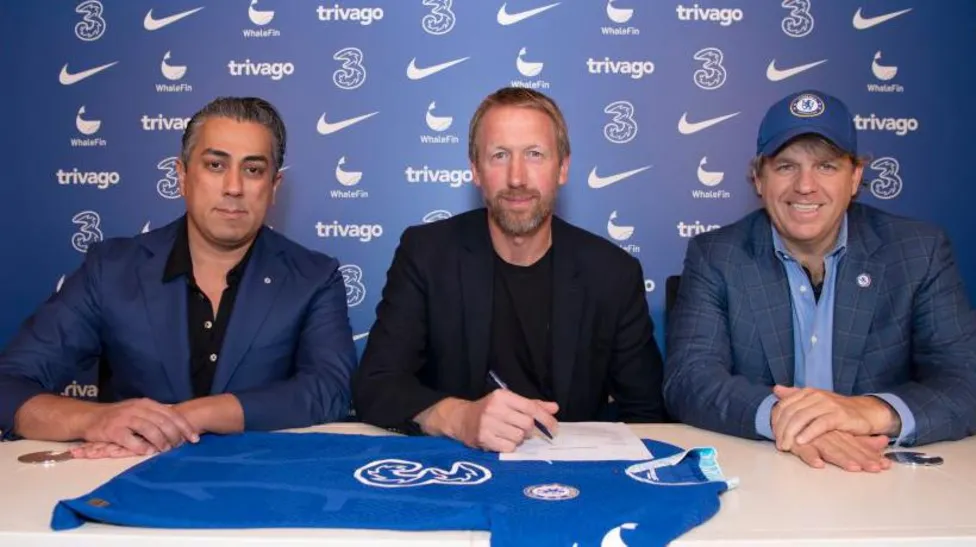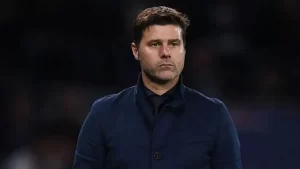Rift Among Chelsea Owners: An In-Depth Look at the Power Struggle
3 min read
Eghbali (left) and Boehly (right) with former manager Graham Potter, who was sacked seven months later.

Eghbali (left) and Boehly (right) with former manager Graham Potter, who was sacked seven months later.
Chelsea FC is currently experiencing a significant internal conflict among its ownership, with Todd Boehly and Clearlake Capital’s Behdad Eghbali at the heart of the discord. This rift is underscored by their contrasting visions and differing stakes in the club, complicating the future of the team.
Todd Boehly, who owns a 12.8% stake in Chelsea, is often perceived as the most prominent figure in the ownership group. This perception is partly due to his high-profile role during the club’s acquisition and his controversial public statements, such as his proposal for a Premier League all-star game. Boehly, who also owns the LA Dodgers, recently expressed a desire to buy out Clearlake Capital, a move that reflects his dissatisfaction with the current arrangement.
On the other side of the divide is Behdad Eghbali, a key player in Clearlake Capital, which holds a majority 61.5% stake in Chelsea. Eghbali, along with Clearlake co-founder Jose E Feliciano, has been influential in the club’s operations and is resistant to any notion of selling their shares. Eghbali’s role has been crucial, and he remains committed to expanding Clearlake’s investment in the club rather than relinquishing control.
The current standoff is a result of a partnership formed in response to the UK government’s sanctions on former owner Roman Abramovich, following Russia’s invasion of Ukraine. The new ownership group, which invested £2.5 billion to purchase Chelsea and committed an additional £1.75 billion to improvements, now finds itself divided, with Boehly and Clearlake’s leadership teams pulling in different directions.
This power struggle mirrors the chaotic transition period of early 2022 when Abramovich was forced to sell the club rapidly. Boehly gained significant attention during the bidding process and took on multiple roles, including chairman and interim sporting director. Under his leadership, Chelsea made substantial investments in players such as Raheem Sterling and Wesley Fofana, spending £255 million in the transfer window.
The initial phase of Boehly’s tenure was marked by rapid changes, including the sacking of Thomas Tuchel and the appointment of Graham Potter. The decision to replace Tuchel, however, was primarily driven by Boehly, with Potter already being lined up before the sacking was officially announced. Boehly’s involvement in club decisions continued until he stepped down as sporting director in January 2023, at which point Eghbali began to exert more influence.

Eghbali’s increased control became evident with high-profile transfers such as Mykhailo Mudryk and Enzo Fernandez, which were part of a record £320 million expenditure in January 2023. The growing divide between Boehly and Eghbali became more apparent towards the end of the 2022-23 season, particularly after Chelsea’s disappointing 12th-place finish in the Premier League.
Tensions came to a head when Boehly publicly criticized the team, leading to a period of introspection and a strategic review. Despite a strong finish to the 2023-24 season under manager Mauricio Pochettino, Eghbali and the sporting directors decided to part ways with Pochettino in May 2024. This decision, driven by disagreements over future transfer strategies and team development, contrasted sharply with Boehly’s previous statements advocating patience and long-term planning.
The departure of Pochettino, which was labeled as a mutual consent exit, highlighted the lack of cohesion within the ownership group. As Chelsea transitions to a new era with manager Enzo Maresca, who has been given a five-year contract, the hope is to stabilize the club’s direction. Both Boehly and Eghbali have shown support for Maresca, but the success of his tenure will be crucial in determining the future dynamics within the ownership group.
As Chelsea navigates this period of internal strife, the broader implications for the club remain uncertain. With more than £1.5 billion invested in transfers and a complete overhaul of the playing staff since Abramovich’s departure, the pace of change has been relentless. The new season’s performance will be critical in shaping the club’s trajectory and the future of its fractured ownership.
In the meantime, Boehly and Eghbali continue to be prominent figures at Stamford Bridge, witnessing Chelsea’s evolving fortunes from their respective positions of power.